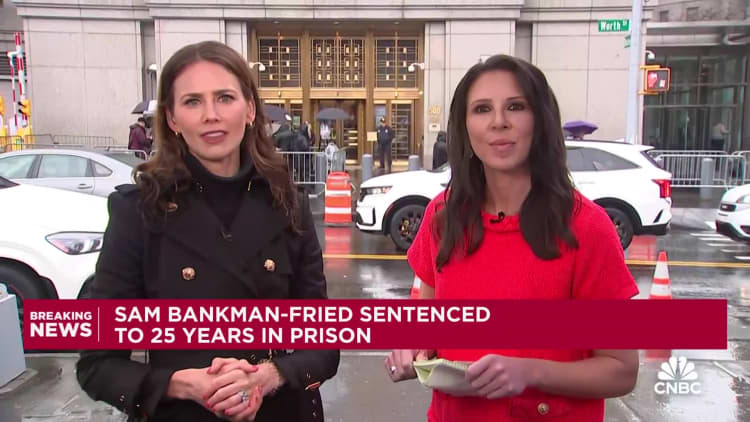

Caroline Ellison, former chief executive officer of Alameda Research LLC, center, arrives at court in New York, US, on Tuesday, Oct. 10, 2023.
Yuki Iwamura | Bloomberg | Getty Images
Caroline Ellison was the star witness in the criminal case against disgraced FTX founder Sam Bankman-Fried. On Tuesday, she will face her own sentencing.
Ellison’s role in the implosion of the crypto empire run by her former boss and ex-boyfriend Sam Bankman-Fried was to lie to investors, help steal billions of dollars from FTX customers, and subsequently re-purpose those funds toward bets and debts accrued at Alameda Research, the digital asset hedge fund she helmed as CEO.
Bankman-Fried and Ellison are both, in the eyes of the U.S. judicial system, guilty of the same crimes.
Two counts of wire fraud, two counts of conspiracy to commit wire fraud, one count of conspiracy to commit securities fraud, one count of conspiracy to commit commodities fraud, and one count of conspiracy to commit money laundering. Those charges carry a statutory maximum sentence of around 110 years, but there’s a sliding scale that takes into account the scope of the crimes and the criminal history of the defendant.
CNBC spoke to former federal prosecutors, trial attorneys and legal experts to get their take on what may be in store for Ellison at Tuesday’s hearing. They agree that Ellison is likely to walk away without any jail time at all.
After a jury of twelve unanimously found Bankman-Fried guilty of all seven criminal charges against him in November, he was sentenced in March to 25 years for his crypto fraud and ordered to pay $11 billion in forfeiture.
Unlike Bankman-Fried, Ellison agreed to a plea deal in December 2022. She pled guilty to all charges against her and spent two years cooperating with the government, regulators and the FTX bankruptcy estate.
Meanwhile, Bankman-Fried continues to deny virtually all criminal wrongdoing and is attempting to get his case retried.
Lawyers for Ellison and Bankman-Fried did not immediately respond to requests for comment.
Government exhibit in the case against former FTX CEO Sam Bankman-Fried.
Source: SDNY
No time behind bars
Cooperation with the prosecution in white collar crimes, even in what has been billed as “one of the biggest financial frauds in American history,” goes a long way.
Ellison was the most important of the several insiders who testified for the government, said former Assistant U.S. Attorney Kevin J. O’Brien, who specializes in white-collar criminal defense in New York.
“Because of the closeness of her relationship to Sam, she was able to provide a personal portrait of Bankman-Fried, an elusive character to be sure, that was probably unique in the government’s case,” O’Brien said.
The federal Probation Department has recommended “time served with three years of supervised release” as a credit to Ellison’s “extraordinary cooperation with the government” and “her otherwise unblemished record.”
While District Judge Lewis Kaplan is under no obligation to accept the Probation Department’s recommendation, O’Brien said that, along with some sort of fine, that would be “a fair sentence” because it reflects the “enormous value” of Ellison’s cooperation.
The U.S. legal system tends to favor reduced sentences for those who assist in bringing down higher targets, said Braden Perry, a former senior trial lawyer for the Commodity Futures Trading Commission.
At most, Perry estimates that Ellison, who is the third executive tied to Bankman-Fried’s enterprise to be sentenced, faces 18 months in prison and three years of supervised release.
Though Ellison was deeply involved in the fraudulent activities, “she did not have the same control or directorial authority as SBF, which will likely influence the judge’s decision about imposing a light sentence,” Perry said.
Encouragement to cooperate
More than likely, Ellison’s conviction will entail several years of supervised release and community service with a slew of attached activity restrictions, such as no trading in both crypto and non-crypto markets or foreign travel, said Yesha Yadav, law professor and Associate Dean at Vanderbilt University.
Unlike Bankman-Fried who has faced public admonition and been portrayed by the government as a recidivist character, Ellison has been praised repeatedly by prosecutors and by new FTX CEO and bankruptcy administrator John Ray III.
“On the stand, she came across as someone who felt guilt and pain at what she had done,” Yadav said.
SBF’s defense team asked for no more than 6.5 years of incarceration, but Kaplan said Ellison’s testimony ultimately proved pivotal to his decision to sentence Bankman-Fried to nearly four times that.
Kaplan also sided with federal prosecutors when he revoked Bankman-Fried’s bail and sent him back to jail for witness tampering after he leaked private diary entries written by Ellison. Kaplan described the leak by Bankman-Fried as one designed to “hurt” and “discredit” Ellison.
Ellison “suffered very public humiliation over the last two years, often with sexist overtones,” Yadav said.
Most judges don’t like sending people to jail who aren’t a threat to harm others in the future, said former federal prosecutor Paul Tuchmann.
“The chance of Ellison ever harming anyone through criminal conduct in the future again are very low,” Tuchmann said.
If Kaplan ends up foregoing jail time in Ellison’s sentence, that could bode well for former FTX engineering chief Nishad Singh and Gary Wang, the co-founder and chief technology officer of FTX. Singh and Wang will be sentenced Oct. 30 and Nov. 20, respectively.
“I do think that if he wants to, Judge Kaplan can ‘afford’ to give all of these people no prison time,” said Tuchmann, adding that “Most judges want to encourage people like that to cooperate, and a sentence of time served and probation is the best way to do that.”
WATCH: Sam Bankman-Fried’s family on sentencing: We are heartbroken and will continue to fight for our son





